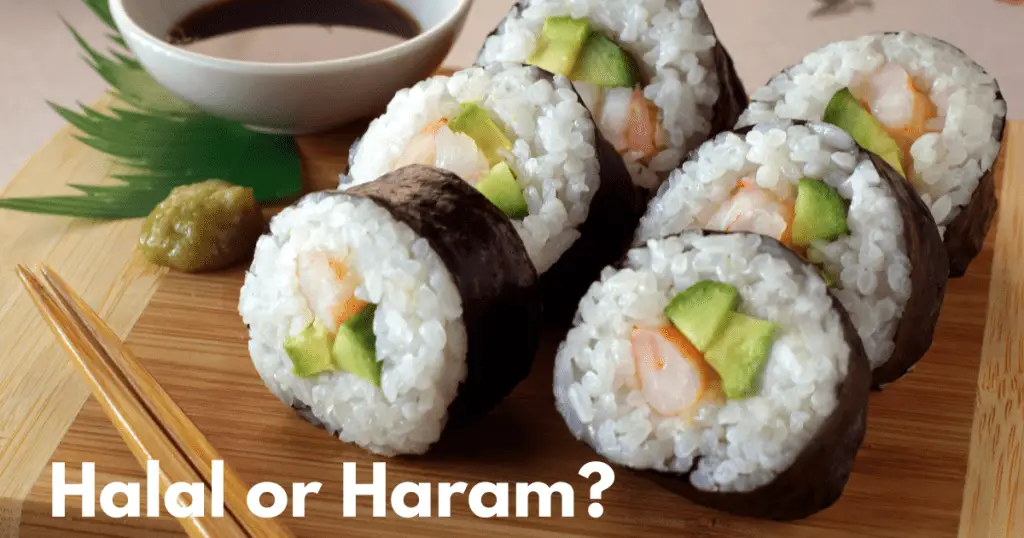Most of the time eating sushi is considered halal. Because of the debate over whether or not seafood is halal, it’s important to make sure that the type of sushi roll follows the rules of your Imam. For some, non-fish seafood such as clams, oysters, and lobster may not be halal.
Which Sushi Rolls are Halal?
The basic ingredients for most sushi rolls in the U.S. are seaweed, sticky rice, vegetables, and some kind of protein from the sea. This means that most sushi rolls will be halal. Its classification depends on the type of protein incorporated. Any sushi that contains fish as the protein such as salmon, tuna, or yellowtail will be ok.
If you are of the Islam denomination that believes non-fish are not halal, then rolls that contain lobster, crab, oyster, or clams will not be safe to eat. The issue with naming certain sushi rolls is that most sushi rolls are original to their creator.
California Roll
The most popular sushi roll in the U.S. is california rolls which is one of the only rolls that have a set base of ingredients. The protein in california rolls is crab or imitation crab, so again it depends on what your Imam believes about certain seafood and halal laws.
Often times a california roll is paired with spicy mayo to impart flavor to the otherwise bland vegetable blend and crab meat. Spicy mayo is made from non-meat products and does not contain alcohol and thus should classify as halal and good for Muslims to eat. Plus it adds a nice spice that the roll would otherwise lack.
Spicy Tuna Roll
Spicy tuna rolls are another classic on any restaurant menu and are considered halal. The main ingredients are rice, seaweed wrapper, tuna, and spicy mayo. It’s one of the most simple sushi rolls available on the market given its short list of ingredients.
These sushi rolls are halal. They do not have any ingredient that is considered haram. Occasionally spicy tuna rolls are merged with yellowtail as well. Yellowtail is another type of fish and therefore will be halal for all Muslims, including those with more restrictions on seafood.
Alaska Roll
One of the more popular sushi rolls is the alaskan roll, and yes this is haram. Most diners enjoy this roll in particular because of the smoked salmon. Smoked salmon, as a type of fish, is considered halal.
The rest of the roll is full of vegetables. However, for this roll, and many other sushi rolls, make sure that none of the ingredients are sauteed in mirin. Mirin is similar to rice wine, however, it is haram. It has enough of an alcohol content to be haram.
What does it take to be considered Halal?
Halal has different qualifications for different food groups. Vegetarian products such as eggs, vegetables, fruits, and grains are fine as is. They don’t need to be harvested or created in a certain way to meet the specifications of halal. However, when eating an animal that used to be alive, there are rules to follow.
Halal meat must be killed in a certain way. A Muslim must slaughter the animal by hand, not with a machine, and say a blessing over the animal before to keep it ok. After death, the blood from the animal must be completely drained as fresh animal blood is not consumed by halal followers.
The general rules of halal for seafood, as dictated by the Quran, are fairly vague. The fish must have scales and must be fished from the sea alive. Like other live animals, the fish should be killed with as little harm done as possible. There is no ritual needed.
The rules of halal specify certain foods that should not be eaten by their followers. The biggest food that falls into this category is pork of any kind. That includes pork chops, bacon, and ham. Non-halal foods, such as pork, are called haram, or forbidden by Islamic law. Halal rules also forbid the consumption of alcohol.
Final Thoughts
Eating sushi is considered halal for most Muslims. Since they are meatless there is no special ritual needed to kill the protein and all the ingredients fall within the specified diet. It’s important to check with you Imam on the specifics regarding seafood and that the sushi does not have mirin as that contains alcohol.



